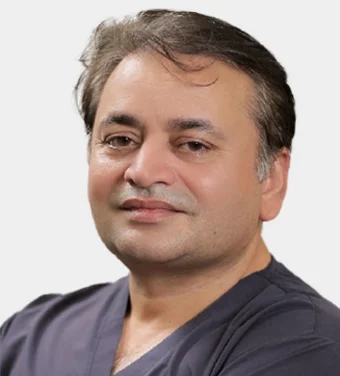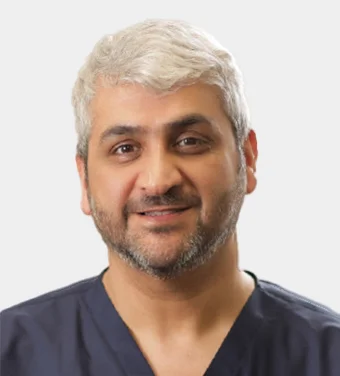_header.webp )
At IBS Hospital, our approach to schwannoma (trigeminal & acoustic) involves precision surgery and comprehensive care. Our team of specialists focuses on effective tumor removal while ensuring patient comfort and the highest standards of safety.
What is Schwannoma (Trigeminal & Acoustic)?
Schwannomas are rare tumors that develop from the nerve sheath surrounding the cranial nerves at the base of the skull. These benign, or non-cancerous, tumors can also develop in other parts of the body. They are broadly classified into two types: Trigeminal Schwannomas and Acoustic Neuromas (also known as vestibular schwannomas).
What are the symptoms of Schwannoma Trigeminal & Acoustic)?
The symptoms of Schwannomas vary according to the type of tumor:
Trigeminal Schwannomas typically present symptoms such as:
- Trigeminal neuralgia or facial pain
- Facial numbness
- Vision problems;
- Coordination difficulties
Acoustic Neuromas are characterized by symptoms including:
- Hearing loss
- Disturbed balance and coordination
- Vertigo;
- Facial numbness or weakness
- Swallowing difficulties
What are the causes of Schwannoma (Trigeminal & Acoustic)?
In most cases, the underlying cause of Schwannomas remains unidentified. Approximately 90 percent of cases are sporadic. Genetic abnormalities associated with Schwannomas are commonly observed in individuals with certain genetic disorders, such as Carney Complex, Neurofibromatosis 2 (NF2), and Schwannomatosis.
How is Schwannoma Trigeminal & Acoustic) diagnosed?
The two most common diagnostic methods for Schwannomas are:
- Magnetic Resonance Imaging (MRI)
- Computerized Tomography (CT scan)
In addition, doctors may recommend other tests, such as:
- CT or MR Angiogram
- Audiogram
How is Schwannoma Trigeminal & Acoustic) treated at IBS Hospital?
Surgery is the preferred treatment for Trigeminal Schwannomas. Doctors often choose retrosigmoid craniotomy, but for smaller tumors, radiosurgery or stereotactic radiotherapy may be options. In cases of Acoustic Neuroma, surgical approaches like keyhole retrosigmoid craniotomy, radiosurgery, or other skull-based interventions can be employed.
Our team of experts that make it possible
Meet the team of highly specialised and experienced neurosurgeons, neurologists, orthopedicians, and other experts in the field of neurology and spine care. Our team is dedicated to providing personalised and compassionate care to each patient, with the goal of helping them achieve the best possible outcomes.

Dr. Vikas Gupta
Senior Neurosurgeon

Dr. Dewaker Sharma
Senior Neurosurgeon

Dr. Sachin Kandhari
Senior Neurosurgeon

Dr. Anup Gogoi
Senior Neurosurgeon

Dr. Ankur Dhandha
Anaesthetist

Dr. Gaurav Sharma
Senior Sports Physiotherapist

Dr. Sachin Samuel
Senior Neuro Physiotherapist

Dr Ankush Arora
Anaesthetist

Dr Amarjyoti Yadav
Anaesthetist
IBS Hospital Empowers Your Treatment with Cutting-edge Technology
We continuously incorporate cutting-edge technologies from around the world into our offerings, such as a surgical system that allows for precise and confident complex procedures. We use magnetic stimulation to treat certain neurological conditions and create personalised brain maps for tailored treatment plans. Nerve monitoring during surgeries ensures the nervous system is not compromised, and a robotic exoskeleton aids in mobility issues. Our goal at IBS Hospital is to provide the best care possible, utilising the latest and most innovative technologies available.


